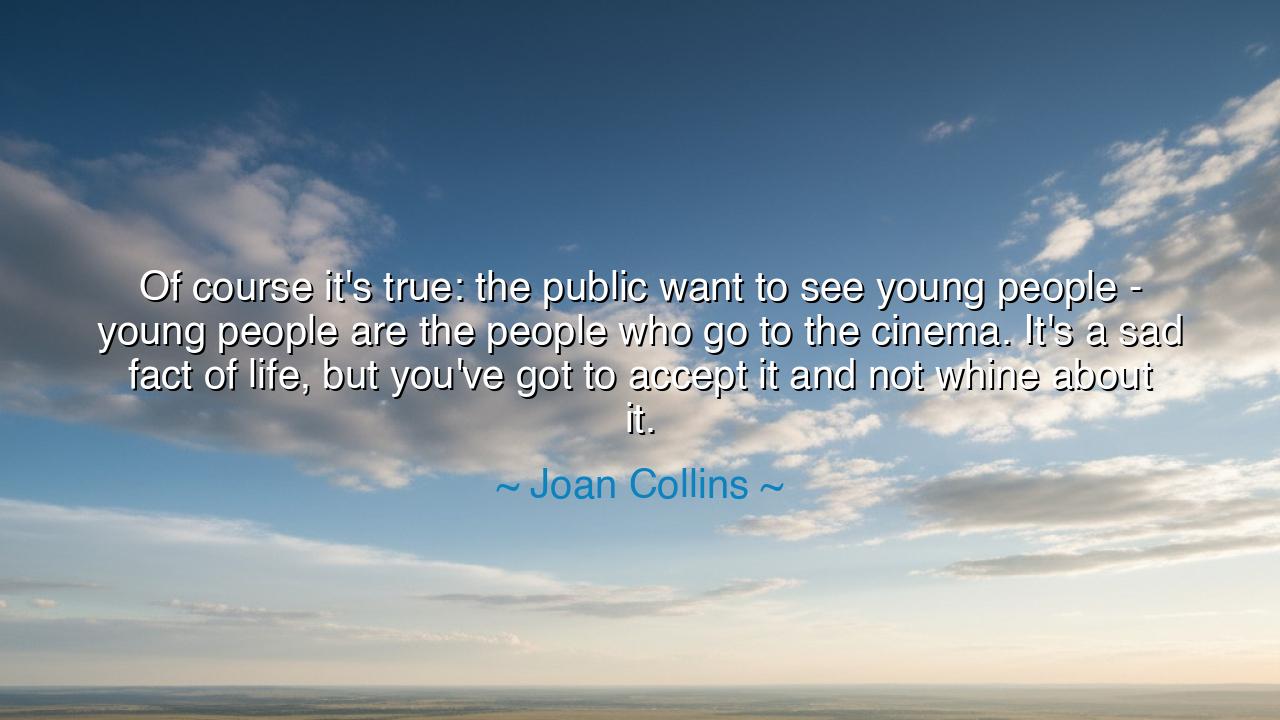
Of course it's true: the public want to see young people - young
Of course it's true: the public want to see young people - young people are the people who go to the cinema. It's a sad fact of life, but you've got to accept it and not whine about it.






Hear, O children of art and ambition, the words of Joan Collins, the star who walked among the lights of stage and screen, and yet spoke with the voice of stark truth: “Of course it’s true: the public want to see young people – young people are the people who go to the cinema. It’s a sad fact of life, but you’ve got to accept it and not whine about it.” In these words, there is neither bitterness nor complaint, but the calm acceptance of a law as old as time: that youth captures the gaze of the world, while age must find its strength not in appearance, but in wisdom.
The meaning is clear, though hard to swallow for many. The world, ever restless, hungers for the fire and beauty of the young. It has always been so, for the poets of Greece sang of Helen’s face, for which nations went to war, and the Romans raised statues of their athletes, glorifying the vitality of their prime. Yet Collins does not utter these words to scorn the elder, but to remind us of reality: that society’s eye turns naturally to youth, and to rail against this truth is to waste one’s spirit in vain.
Consider the words “a sad fact of life.” They echo the lament of generations who must one day surrender the brightness of youth. Yet, within this sadness lies also liberation. For if one accepts that the world craves the young, then one need not fight fruitlessly for their place in the spotlight. Instead, one may cultivate what the young do not yet have—experience, depth, endurance. Thus, Collins teaches us that acceptance is not defeat, but transformation.
History bears witness to this truth. In ancient Sparta, the warriors in their youth fought with strength of muscle, but it was the elders of the Gerousia, gray-haired and scarred, who guided the city with wisdom. The young drew the eyes of the people with their glory in battle, but the old carried the burden of decision, the vision of what was to come. So too must the artist, the worker, the dreamer—when youth no longer crowns them—learn to wield another form of power.
And think, too, of the story of Sarah Bernhardt, the great actress of the 19th century. When age began to weigh upon her, and critics whispered that her time had passed, she did not despair. She accepted the truth that audiences loved the new, the young, the dazzling. Yet she turned this to her advantage, taking roles that showcased her mastery of voice and presence, the artistry of a lifetime. She did not whine, as Collins warns against; she adapted, and in doing so, she became eternal.
The lesson for us is this: do not cling to the illusions of permanence. The world exalts youth, yes, but each season has its power. To fight against the turning of the seasons is to exhaust oneself; to accept and adapt is to endure with grace. The young may take the stage, but those who accept their place with dignity, who mentor, who build, who guide, shall always remain essential.
As for practical action, learn to accept the shifting tides of life. If you are young, know that the world will shine its light upon you—use that light wisely, not arrogantly, for it fades swiftly. If you are older, do not despair when the crowd looks past you; instead, build foundations, share wisdom, and cultivate mastery that cannot be dimmed by age. Above all, do not complain against the nature of things, for whining is wasted breath, while acceptance gives birth to new paths.
Thus, Joan Collins’ words are not resignation, but revelation. The public may hunger for youth, but life itself hungers for growth. Those who embrace change with courage, who turn sadness into wisdom and defeat into transformation, shall never truly fade, for their light will shine in a different form, one that endures long after the fleeting glories of youth have passed.






AAdministratorAdministrator
Welcome, honored guests. Please leave a comment, we will respond soon